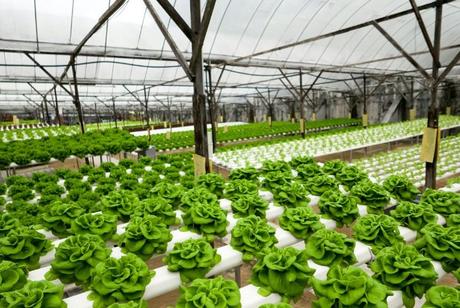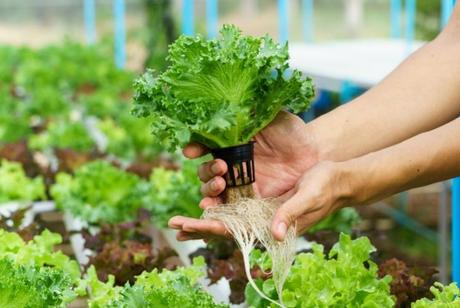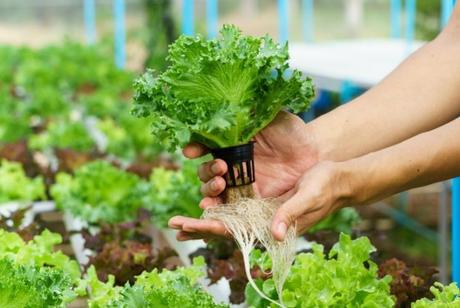Advantages & Disadvantages of Hydroponics
With more people embracing healthy lifestyles, there has been a massive surge in producing crops locally. Hydroponics systems address this concern by facilitating the production of healthy, organic, and local crops right from the comfort of one’s home.
But what exactly is hydroponic farming all about? What pros and cons does it come with? Well, these are some of the many questions we will answer over the course of this article.

Hydroponic Farming in a Nutshell
In the simplest terms, Hydroponic Farming can be defined as a form of soil-less gardening. The process involves growing a bunch of healthy plants without using soil. Here, the soil is substituted by an alternative nutrient like water. So, all your plant needs are proper water and sunlight to thrive. The process is quite simple and since the soil is not involved here, it is also low-maintenance and hassle-free.
Advantages of Hydroponic Farming
If you’re considering the possibility of Hydroponic farming, here are a couple of benefits that you are likely to achieve:
1. No Soil Involved
Since Hydroponic farming involves growing crops without soil, it is an ideal option for anyone who has limited accessibility to land. During the mid-nineties, Hydroponics was used for supplying fresh crops to the troops in the distant Wake Islands.
For the uninitiated, the Wake Islands is a distant arable area located in the Pacific Ocean. In recent years, Hydroponic is often deemed as the farming method of the future as several astronauts in NASA have considered this possibility for growing crops in the space.
2. Optimal Use of Location
Since every requirement of the plant is provided for and duly maintained in a structured system, Hydroponic Farming can be performed anywhere. So, if you live in a space-crunched apartment, you can always consider Hydroponic Farming where the plants will be grown in your bedroom or balcony.
When it comes to conventional farming, the plant roots expand and thoroughly spread out in a bid to search for food and oxygen levels in the soil. However, such is not the case with Hydroponics.
Here, the roots are already submerged in a tank of oxygenated solution that has direct contact with the vital minerals. That means you can grow multiple plants in proximity without having to worry about space.
3. Complete Control Over Climate
As with greenhouses, hydroponic growers have absolute control over the climate. They can adjust the temperature, the intensification of light, and the humidity levels as per their requirements.
So, in a way, if you practice Hydroponic Farming you can continue growing crops all year round without having to worry about the season. This is also likely to boost the business profits of farmers.
4. Saves Water
The plants grown in a Hydroponic system barely use around 10% of the water when compared to the conventionally field-grown plants. The water used here is drastically less because unlike conventional farming water is reused or re-circulated.
Plants take in their required water, while the excess water is captured and trapped back in the system. Water loss, therefore, occurs only through two pertinent forms: evaporation and system leaks. With that being said, an efficient Hydroponic setup will minimize leaks or won’t have it in the first place.
It is assumed that agriculture involves only 80% of groundwater and surface water in the United States. Since water is already becoming a critical issue amid the growing need for food production, Hydroponics is deemed to be an excellent solution for addressing this issue.
5. Optimal Use of Nutrients
When it comes to Hydroponics Systems, you have absolute control over the nutrients as required by the plants. Even before proceeding with the farming, you can check what kind of nutrients your plants require and then mix particular amounts of those nutrients with water at different stages. Since the nutrients are duly conserved in tanks, there is no possibility of nutrient loss.
6. pH control
Since every mineral is directly in touch with water, you can always manually adjust and tweak the pH level as and when required. This will ensure that the plants receive optimal nutrient intake.
7. Faster Growth Rate
Another major benefit of the Hydroponic system is that it ensures a faster growth rate. Here, you are entirely in control over the environment required for the plants’ growth.
That means you have control over every parameter like the temperature, the surrounding light, moisture, and most importantly, the nutrients. The plants will be placed in an ideal condition and nutrients will be sufficiently provided where they can directly contact the root system.
This way, plants won’t waste their valuable energy looking for diluted nutrients submerged deep within the soil; rather, they can almost entirely be focused on thriving and boosting the production of fruits.
8. Zero Weed
If you’ve ever tried conventional gardening (with soil) you’re probably familiar with how irksome weeds can get. Trimming weeds is one of the most exhausting tasks for crop owners or gardeners. With tilling, plowing, and hoeing, the process practically seems endless.
Since weed is entirely associated with soil, when it comes to soilless hydroponic farming, you won’t have to bear the trouble of dealing with weeds anymore.
9. Fewer Pests and Ailments
As with weeds, removing soil ensures that your plants are not as susceptible to soil-borne pests like gophers, groundhogs, or a bunch of birds. You can also protect them from ailments like Fusarium and Rhizoctonia.
Since Hydroponic Farming involves growing plants in an entirely closed system, the gardener has entire control over the related variables.
10. Fewer Insecticides and Herbicides Involved
Since Hydroponic Farming doesn’t involve any soil, the process also eliminates the need and use of chemicals. Over time, this enables you to grow clean and healthy foods. Your safety is kept at priority and never compromised on at any point.
11. Time-Saving Process
Besides spending significantly less time over tilling and cultivating your plants and getting rid of weeds, you also get to witness quicker and less-time intensive plant growth in Hydroponic farming. Every time agriculture is designed with a space of technology, Hydroponic Farming fits right in.
12. Relieves Stress
As with any other form of farming, Hydroponic Farming is one of the most stress-relieving hobbies. It gives you that one rare chance to reconnect with nature.
So, when you are worked up after a tedious day at the office, you can always come back home to your little Hydroponic garden where you rear and grow plants from scratch.
In the beginning, you can proceed with fresh and delicious veggies and then proceed to move forward to herbs and fruits. Either way, the process is incredibly relaxing and it adds just the right dose of freshness to your small little space.

Disadvantages of Hydroponic Farming
As with any method of farming, Hydroponics comes with its own set of cons. In the following section, we will discuss some of these disadvantages of hydroponic farming in detail:
1. Time Consuming
While the process of Hydroponic Farming might seem feasible and convenient, it is slightly time-consuming as well. The plants thriving in soil may be ignored for days or even weeks as both nature and soil perfectly balance everything. However, such is not the case with Hydroponics.
Since the plants growing in this process almost entirely thrive on water, you need to be gentler with them. The water needs to be replaced at regular intervals, and you need to continuously check on the plants to see if they are doing just fine.
2. Requires Some Expertise
The process of Hydroponic farming depends on a range of equipment that requires proper expertise. Unless you know how to operate this equipment, the plants won’t thrive or flourish as much as you’d want them to.
Even the minutest mistake can affect the plant growth almost entirely destroying your Hydroponic System. That is why it is extremely important to familiarize yourself with the equipment and techniques involved in this process of farming.
3. Risks Of Water and Electricity
Two major factors in Hydroponic farming are electricity and water. So, unless you have adequate water or stable electricity, the Hydroponic system won’t thrive well. While growing plants in this system, you also need to ensure proper safety precautions so that the plant growth isn’t affected at any stage.
4. Threats of System Failure
If you are using electricity for managing your entire Hydroponic system, you need to take precautionary measures during the event of power blackouts or dimouts.
Since the system won’t operate due to the lack of electricity supply, thereby drying out the plants- it is extremely important to take this precaution even before you proceed to move forward with a Hydroponic system.
5. Debates Over the Organic Nature
Over the last couple of years, there has been significant debate and deliberation on whether Hydroponic Farming is indeed a certified method of organic farming.
Many farmers have questioned whether plants grown through Hydroponic farming can be indeed certified as Organic as they do not receive the microbiomes as available in the soil.
However, people across the globe have produced Hydroponic plants like tomatoes, lettuces, and other leafy vegetables over the last decade. Countries like Australia, the US, and the Netherlands have already performed and succeeded in this mode of farming. At the end of the day, it has produced food for several thousands of people.
It is worth noting here that you cannot expect any method of farming to be perfect. Even if the plants are growing in soil, there will be risks of pests and pesticides when compared to Hydroponics.
That is why certain organic farming methods are suggested for Hydroponic farmers as well. For instance, certain growers provide the required Microbiomes to the plants by using organic growing artifacts like coco coir or worm casting. Alternatively, natural nutrients like fish, cottonseeds, bones, or even alfalfas may be used in this process.
6. Expensive
Unlike conventional soil-based farming, Hydroponic Farming involves expensive equipment (at least for the first installation). Regardless of the kind of system, you plan to build, you will require containers, high-quality lighting, an accurate timer, and quality nutrients.
After finally setting up the system, the recurring cost will only be limited to the nutrients and the electricity. So, if you are not willing to shell-out a heavy initial expense, this may not be the best option for you.
7. Return on Investment
If you already keep up with the updates regarding agricultural start-ups you’re probably familiar with the costs involved in Hydroponic Farming. It is important to note that Hydroponics is an excellent advancement when it comes to the agricultural sector.
However, if you plan to perform this farming on a large, commercial scale, the return on investment won’t be as high. That is primarily because of heavy initial expenses and the unsteady profits. As of now, it is not very convenient to come up with a proper, profitable plan to urge farmers in trying Hydroponic farming commercially.
Overall, Hydroponic Farming is an excellent method of farming and its benefits often outweigh the cons. Since you are now familiar with the pros and cons of Hydroponic farming, consider giving this novel method of farming a try. Given the many benefits it comes with, the process will certainly meet and exceed your expectations.
References:


